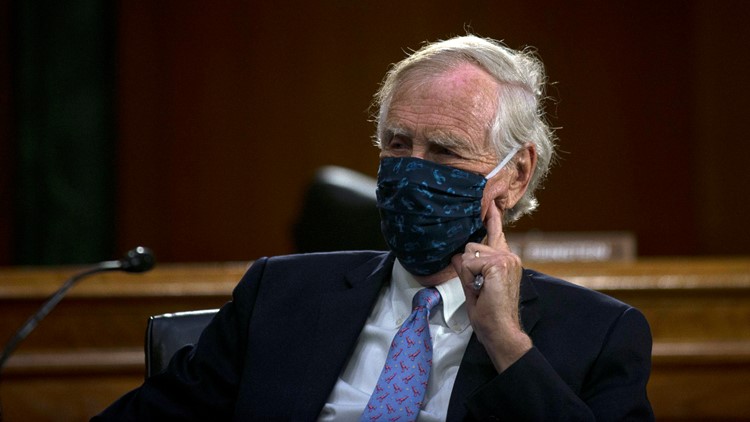WASHINGTON, D.C., USA — On the first full day of Joe Biden's presidency, Maine Independent Sen. Angus King talked about what lies ahead in Congress, in terms of both policy and bipartisan unity, with MSNBC’s Andrea Mitchell.
King said with some negotiation on a COVID-19 relief package, he’s “reasonably optimistic” a package would get a two-thirds majority, bipartisan support in the Senate.
“I think most people on both sides of the aisle realize the job isn't done with regard to Covid, that there's more work necessary in terms of assistance to states and localities, vaccine distribution—you just had an important section on that that's going to take additional resources—support for individuals,” King said. “So I think there's going to be a fair amount of debate, but I'm reasonably optimistic that we'll be able to get 60 votes and that's it's better when we can then you've got bipartisan buy-in and I think that's a much stronger position to work from.”
The nuts and bolts of the transition process are still well underway as Congress works to confirm President Joe Biden’s Cabinet members. But the Senate faces Republican opposition on some of Biden’s picks—namely from Missouri Sen. Josh Hawley, who said he would block a procedural move to bypass full committee consideration of Alejandro Mayorkas, Biden’s nominee for secretary of the Department of Homeland Security.
“I don't know what Hawley’s up to,” King said. “He's already sort of harmed his reputation in the Senate and this seems to be another step in that direction.”
But King is optimistic that at least some National Security nominees will be confirmed in the next few days.
“There have been some sporadic points of opposition, but I think we'll be able to get the Cabinet in place—at least the National Security people—within the next few days, early next week,” King said.
King said Thursday that he was reluctant to allow a congressional waiver of a law that prohibits a military officer from holding the job within seven years of leaving the service for Biden's choice to head the Pentagon, retired General Lloyd Austin. Austin has been retired for four years. But King said he ultimately voted to allow it because he said Austin is “the right guy” for the job.
Maine Democratic Rep. Jared Golden, meanwhile, voted against the waiver Thursday, saying he is "concerned about waiving the seven-year cooling-off period."
"This policy is meant to provide a cooling-off period between active service in the military and assuming the civilian leadership position of secretary of defense, a cabinet position that reports directly to the commander in chief, the president of the United States," Golden said in a statement. "My decision is in no way a reflection of any lack of respect for General Lloyd Austin, nor a lack of confidence in his ability to lead our military and the men and women in uniform. [...] This is not a vote about the qualifications of General Austin -- that is for the Senate to decide. This vote is a decision over whether or not the law’s requirement for a seven-year cooling-off period will remain a meaningful constraint in the future."
Read Golden's full statement at the end of this story.
The support for the waiver passed in the Senate Armed Services Committee Thursday morning later passed in the House and the Senate.
Austin would become the first Black secretary of defense in U.S. history if confirmed.
Of course, Mitchell asked King if he would vote to convict now-former President Donald Trump, but King said he needs to hear all the evidence before he can comment, despite backing the House’s impeachment effort.
“I will say that his actions after the election particularly after about the first of December when it was absolutely clear what the outcome was, was profoundly damaging to our country—the most damaging activity on behalf of the U.S. president that I've ever seen,” King said. “He basically delegitimized the Democratic process. He misled millions and millions of people he then invited the mob to Washington.”
He said there are two questions that need to be answered.
What intelligence did Trump have that morning or the day before as to the nature of the crowd, and what their proclivities were?
“If he knew in advance that this was a crowd that was prone toward violence, and that they were planning to storm the capital…It seems to me that makes his culpability even greater,” King said.
The second question King said needs answered is: What did he do that afternoon when it was going on?
“Did he in fact sit in the white house and just watch TV and think it was pretty cool, or was he deeply concerned and tried to shut down? Unfortunately, he didn't take any real action to try to shut it down until several hours into the melee at the Capitol.”
“It’s a very unusual situation where the jury are also witnesses to what went on,” he said.
That reason is also why Maine Republican Sen. Susan Collins says she will not comment on impeachment.
“[W]e won't have any further comment on impeachment because of the Senate's constitutional role in those proceedings, which includes sitting as a jury,” Collins’ Communications Director Annie Clark previously said in a statement.
To watch the full interview with King, click here.
Golden's full statement:
“Today I voted against waiving the statutory requirement that the secretary of defense not have served in active military duty within the past seven years. This policy is meant to provide a cooling-off period between active service in the military and assuming the civilian leadership position of secretary of defense, a cabinet position that reports directly to the commander in chief, the president of the United States.
My decision is in no way a reflection of any lack of respect for General Lloyd Austin, nor a lack of confidence in his ability to lead our military and the men and women in uniform. Should the collective judgment of the Congress be to approve President Biden’s request for this waiver, I hope my colleagues in the Senate will move quickly to confirm General Austin as the new secretary of defense, as I believe he is qualified by his long and honorable record of service to the nation in the United States Army.
I am, however, concerned about waiving the seven-year cooling-off period, a policy tied to a foundational principle that our nation’s military should be subject to civilian control. I am also disappointed by the lack of substantive congressional debate that has been devoted to this important question. This requirement was put into place in 1947 with the creation of the Department of Defense and the position of the secretary of defense. To date, Congress has waived this requirement only twice, once in 1950 and not again for 67 years until it was granted in 2017 to Gen. Mattis, in part to accommodate for a president with no formal experience in government.
By contrast, President Biden is uniquely qualified for the times we find ourselves in, and his experience both as Vice President and U.S. Senator prepare him well to serve as our commander in chief. History shows that Congress has long respected and taken seriously the requirement of civilian control and provided a waiver for only the most exceptional circumstances. I do not believe we find ourselves in such circumstances today.
This is not a vote about the qualifications of General Austin -- that is for the Senate to decide. This vote is a decision over whether or not the law’s requirement for a seven-year cooling-off period will remain a meaningful constraint in the future. If it becomes a mere formality in nature, it will no longer serve any meaningful purpose in ensuring civilian control of the military. It is not insignificant for Congress to waive this requirement twice in four years after having done so only twice over a period of nearly seven decades. The principle of civilian control of the military is far too important for our democracy to justify supporting this waiver under the circumstances confronting the nation at this moment.”



